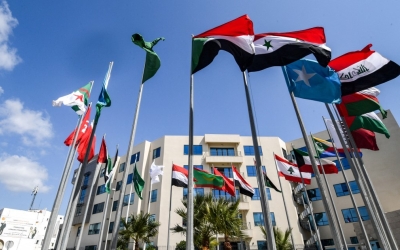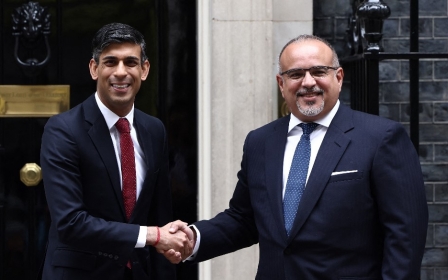Bahrain: Egyptian threatened with deportation missing for over two weeks

An Egyptian man who faced deportation from Bahrain after he was arrested earlier this month has disappeared, rights groups and informed sources have told Middle East Eye.
Meanwhile, a second Egyptian man, arrested in Manama on the same day and whose whereabouts since have been unknown to his family, reappeared in Egypt late on Wednesday, according to his lawyer.
Muhammad Hassanein, 45, and Sayed el-Agez, 59, were detained on 2 August on warrants brought by Egypt, believed by their families to have been issued based on political reasons.
The men had lived in Bahrain for more than eight years and had residency permits. Agez, who is a Turkish-Egyptian dual national and father of eight, worked in business and Hassanein, who has three children, as a computer engineer.
Before moving to Bahrain, the men, both from the northern Egyptian city of Mansoura, were said to be opposition figures. Hassanein worked for an MP in Talkha, a city near Mansoura. MEE understands that neither have been politically active since they left Egypt.
New MEE newsletter: Jerusalem Dispatch
Sign up to get the latest insights and analysis on Israel-Palestine, alongside Turkey Unpacked and other MEE newsletters
Their last known whereabouts were Bahrain’s Central Investigation Department (CID) in Manama, where they were taken on the day of their arrests.
For two weeks, until news of Agez's appearance in Egypt, rights groups and those with knowledge of the pair's arrest had no information about their whereabouts.
They said CID authorities told the men's families that they had been deported to Egypt on the basis of the warrants against them, but Bahrain's official immigration system shows they are still in the country.
'We are being told that they have been deported. On the other hand, we’ve been told that they are not on the ground where they were supposed to be deported to'
– Falah Sayed, MENA Rights Group
“On the one hand, we are being told that they have been deported,” said Falah Sayed, human rights officer with the Geneva-based MENA Rights Group. “On the other hand, we’ve been told that they are not on the ground where they were supposed to be deported to.”
Late on Wednesday, Ismail Rashid, Agez's lawyer in Egypt, wrote on Facebook to say his client was in Egypt and they had attended a meeting with authorities, but he shared no further details about why his client had been deported.
Hassanein's whereabouts remain unknown.
It is also unclear which agency issued or circulated the warrants on Egypt’s behalf, in order to arrest the men. MEE understands that only Interpol and the Arab Interior Ministers' Council (AIMC), a security body run by Arab League members, would have had jurisdiction to do so.
Authorities in Egypt and Bahrain, Interpol and the AIMC have not responded to requests for comment.
Meanwhile, it has also emerged that another Egyptian-Turkish dual citizen, Tariq al-Shafei, is currently at risk of deportation to Egypt from Saudi Arabia.
Arrests and disappearances
The case is only the latest disappearance of individuals in the region arrested on warrants believed to be linked to politically motivated charges.
In May, Khalaf al-Romaithi, an Emirati-Turkish dual national, was apprehended while on a trip to Jordan by airport security officials purportedly acting on a UAE request for his arrest and extradition.
Romaithi was convicted in absentia in a mass trial in the UAE, which human rights groups have widely criticised as grossly unfair and politically motivated.
The businessman was scheduled to appear in an Amman court on 16 May, but disappeared before that hearing. He is believed to have been taken to the UAE, but his exact whereabouts remain unknown.
Human rights groups and UN experts have raised concerns in recent months over the AIMC’s circulation of warrants related to political activities.
In June, the UN experts sent a letter to the Arab League warning that the body was failing to shield individuals wanted for free speech and other political activities from extradition, and was neglecting its duty to assess the risks of torture and ill-treatment people could face if they were sent home.
Also last month, Sherif Osman, an Egyptian-American activist imprisoned in Dubai for over 40 days last year, filed a federal lawsuit in the US against the AIMC, Interpol and the Egyptian government, among other defendants, for their role in his detention.
Osman was visiting family when he was arrested at a Dubai restaurant on 6 November and said he was told hours later that Emirati authorities had acted on an extradition request from Egypt.
In his complaint, filed in the US District Court in Washington, Osman’s lawyers allege that it was 31 videos he posted to his YouTube channel, calling for peaceful protests in Egypt ahead of the Cop27 climate change conference, which triggered his detention.
The complaint also alleges that Interpol and the AIMC "colluded to shift the purported justification for Plaintiff Osman’s imprisonment from an Interpol red notice to an AIMC red notice".
Middle East Eye delivers independent and unrivalled coverage and analysis of the Middle East, North Africa and beyond. To learn more about republishing this content and the associated fees, please fill out this form. More about MEE can be found here.





